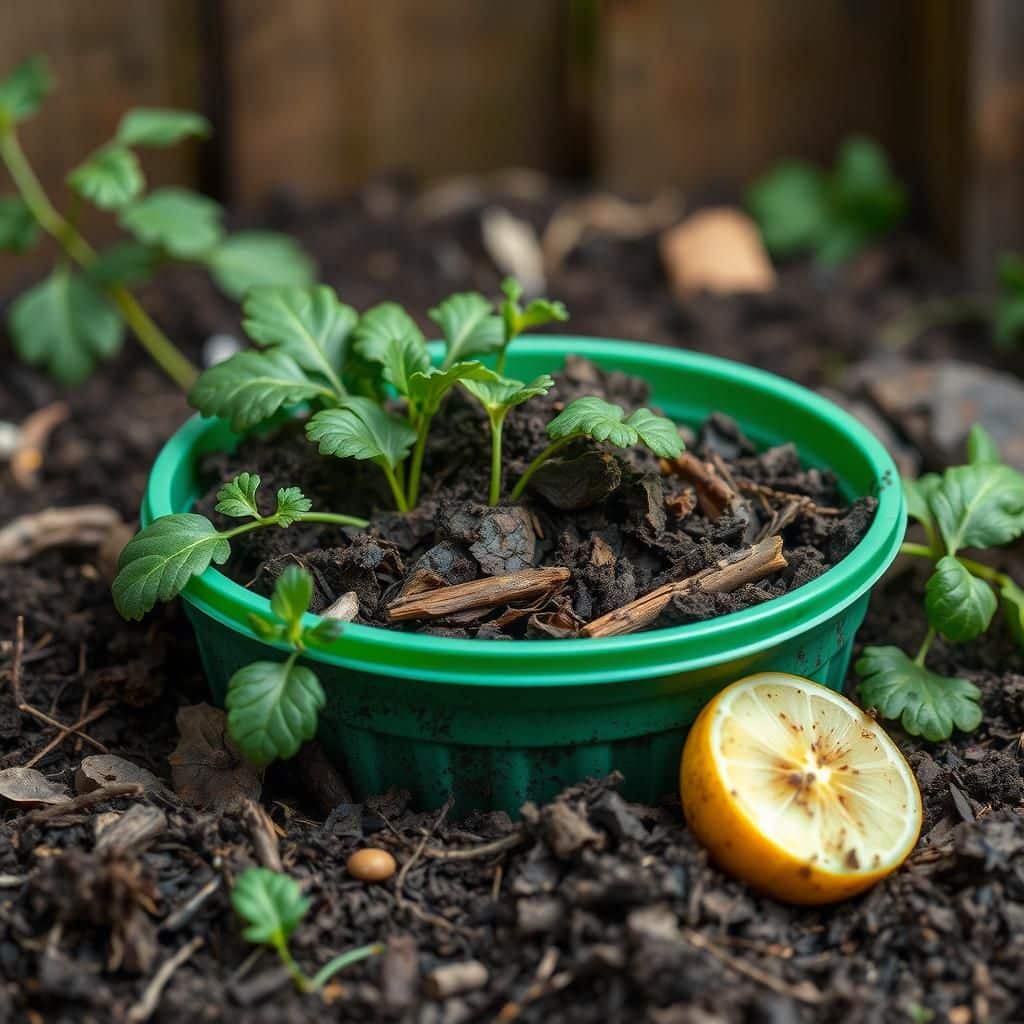How Long Does It Take to Make Compost from Kitchen Waste? A Comprehensive Guide

Composting is an eco-friendly practice that transforms kitchen waste into nutrient-rich soil, promoting sustainability and reducing landfill waste. However, many people wonder how long the composting process takes and what factors influence its duration. This comprehensive guide delves into the timeline for making compost from kitchen scraps, exploring the stages involved, optimal conditions, and tips for accelerating the process. Whether you're a beginner or an experienced composter, understanding the intricacies of composting time will help you manage your kitchen waste effectively and contribute to a healthier environment. Join us as we unravel the timeline and techniques to create your own compost.
How Long Does It Take to Make Compost from Kitchen Waste?
Making compost from kitchen waste typically takes about three to six months, depending on various factors such as the type of materials used, the composting method employed, and environmental conditions. Kitchen waste like fruit and vegetable scraps, eggshells, and coffee grounds can break down relatively quickly, but achieving optimal compost requires a balanced mix of greens (nitrogen-rich materials) and browns (carbon-rich materials). Aeration, moisture, and temperature also significantly influence the decomposition rate. Maintaining the right balance can expedite the composting process, resulting in nutrient-rich soil amendment for your garden or plants.
Factors Affecting Composting Time
Several factors influence how long it takes to make compost from kitchen waste. The size of the waste materials plays a crucial role; smaller pieces decompose faster than larger ones. Additionally, the carbon-nitrogen ratio is critical; a balanced mix accelerates the composting process. The moisture level should be maintained around 40-60%, and proper aeration promotes microbial activity, which hastens decomposition. Lastly, environmental conditions, such as temperature, greatly affect the composting timeline; warmer temperatures increase microbial activity and speed up the process.
Composting Methods
The method used for composting significantly impacts the time required to produce compost from kitchen waste. Traditional composting in a pile or bin usually takes three to six months but can be accelerated through techniques like Hot Composting, which involves maintaining higher temperatures and regularly turning the pile. Alternatively, Vermicomposting utilizes worms to speed up decomposition, resulting in compost in as little as two to three months. Additionally, using a compost tumbler can facilitate faster composting due to increased aeration and mixing.
Types of Kitchen Waste
The types of kitchen waste being composted also affect the time it takes to create compost. Fruit and vegetable scraps break down relatively quickly, while tougher materials, such as nutshells, may take longer to decompose. Incorporating a diverse range of kitchen waste, such as coffee grounds, eggshells, and leftover grains, ensures a balanced carbon to nitrogen ratio and promotes rapid decomposition. However, care must be taken with certain items like meat, dairy, and oily foods, which can slow down the process and attract pests.
See also:
Timeframe Based on Composting Setup
The specific setup used for composting can yield varying timeframes for producing compost. For instance, open compost piles generally take longer, around six months or more, as they might be less optimized for uniform decomposition. In contrast, well-structured bin systems can produce compost more rapidly, typically within three to four months, if conditions are ideal. Composting systems like Bokashi can ferment kitchen scraps quickly, leading to rapid compost production, often within two weeks to four weeks before additional soil application.
Temperature and Aeration's Role
Temperature and aeration are critical factors in the speed of the composting process. Maintaining a higher temperature of around 130°F to 160°F helps kill pathogens and speed up the breakdown of organic material. Regularly turning the compost pile provides necessary aeration that promotes the activity of microorganisms responsible for decomposition. When temperature and aeration are adequately managed, kitchen waste can turn into finished compost in about two to three months, making these factors essential for efficient compost production.
| Factor | Impact on Composting Time |
|---|---|
| Size of Waste | Smaller pieces decompose faster |
| Carbon-Nitrogen Ratio | Balanced ratio accelerates breakdown |
| Moisture Level | Optimal moisture promotes microbial activity |
| Temperature | Higher temperatures increase decomposition speed |
| Aeration | Regular turning enhances airflow and activity |
Understanding the Composting Process
Composting kitchen waste is a natural process that transforms organic materials into nutrient-rich compost. The duration of this process can vary significantly based on several factors including the type of waste, the size of the materials, the method of composting, and the environmental conditions. Typically, it can take anywhere from a few weeks to several months for kitchen waste to decompose and break down into usable compost. Regular monitoring, maintaining optimal moisture levels, and ensuring proper aeration can accelerate the composting process, yielding rich compost sooner and promoting a viable recycling option for kitchen scraps.
Factors Affecting Composting Time
Several factors influence how long it takes to make compost from kitchen waste. The carbon-to-nitrogen ratio is crucial, as a balance between brown materials (high carbon) and green materials (high nitrogen) helps in speeding up decomposition. Additionally, the size and surface area of the waste also matter; smaller pieces decompose faster as they provide a larger area for microbial activity. The temperature at which composting occurs is another significant factor; higher temperatures generally enhance activity among microorganisms, leading to quicker results.
Types of Kitchen Waste Suitable for Composting
Not all kitchen waste is suitable for composting, but common items include fruit and vegetable scraps, coffee grounds, eggshells, and even paper towels. These materials provide essential nutrients and can break down effectively in a composting environment. However, it's important to avoid adding meat, dairy, and oily foods as they can attract pests and create unpleasant odors, ultimately slowing down the composting process.
See also:
Composting Methods to Consider
There are several methods for composting kitchen waste, each with varying timelines. Hot composting can produce usable compost in as little as three weeks if managed correctly, while cold composting methods might take several months. Other popular methods include compost tumblers for quick mixing and worm bins for composting small quantities indoors, each with their unique advantages regarding time and efficiency.
Maintaining Optimal Conditions for Faster Composting
To enhance the speed of composting, maintaining optimal conditions is essential. Keeping the compost pile moist but not overly wet is vital, as excessive moisture can create anaerobic conditions, slowing decomposition. Ensuring sufficient aeration by turning the compost regularly introduces oxygen, vital for the microbes breaking down the waste. Additionally, monitoring the temperature and adjusting materials accordingly can also advance the composting timeline.
Signs Your Compost is Ready
Recognizing when compost is ready can sometimes be tricky. Generally, mature compost will have a dark, crumbly texture and an earthy smell. It should not resemble the original materials but instead should appear broken down and homogenous. Checking for temperature drops after active composting can also signal that the process is nearing completion, indicating that the compost is ready for use in the garden.
Questions from Our Readers
How long does it take to make compost from kitchen waste?
Making compost from kitchen waste typically takes three to six months under optimal conditions. Factors such as the material used, temperature, and moisture levels can affect this timeframe significantly.
What factors influence the speed of composting kitchen waste?
The speed of composting kitchen waste is influenced by several factors, including the carbon-to-nitrogen ratio, the size of the waste particles, and how often you turn the compost pile. Adequate airflow and humidity also play crucial roles in expediting the composting process.
See also:
Can I compost all types of kitchen waste?
Not all kitchen waste is suitable for composting. While most fruits, vegetables, and coffee grounds are excellent for compost, items like meat, dairy, and fats should be avoided, as they can attract pests and create odors.
Is it better to use a compost bin or pile for kitchen waste?
Using a compost bin is often more efficient than a compost pile, as it helps to contain the material and maintain ideal temperature and moisture levels. Additionally, a bin can reduce pests and keep the composting area more organized.
https://youtube.com/watch?v=zy70DAaeFBI
If you want to read more articles like How Long Does It Take to Make Compost from Kitchen Waste? A Comprehensive Guide, we recommend you check out our Compost category.
Leave a Reply
Related Articles